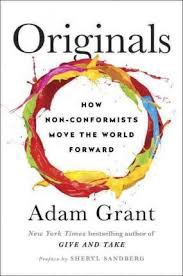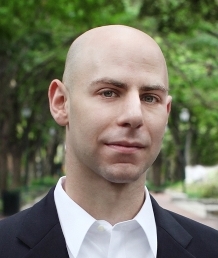
“Originals: How Non-Conformists Move the World” by Adam M. Grant.
How do creative people come up with great ideas? Organizational psychologist Adam Grant studies “originals”: thinkers who dream up new ideas and take action to put them into the world. In this talk, learn three unexpected habits of originals — including embracing failure. “The greatest originals are the ones who fail the most, because they’re the ones who try the most,” Grant says. “You need a lot of bad ideas in order to get a few good ones.”
Top 26 “Originals” Quotes

“In the deepest sense of the word, a friend is someone who sees more potential in you than you see in yourself, someone who helps you become the best version of yourself.” ― Adam M. Grant
“Argue like you’re right and listen like you’re wrong.” ― Adam M. Grant
“Practice makes perfect, but it doesn’t make new.” ― Adam M. Grant
“Being original doesn’t require being first. It just means being different and better.” ― Adam M. Grant
“Procrastination may be the enemy of productivity, but it can be a resource for creativity.” ― Adam M. Grant
“The reasonable man adapts himself to the world; the unreasonable one persists in trying to adapt the world to himself. Therefore all progress depends on the unreasonable man.” George Bernard Shaw” ― Adam M. Grant
“To become original, you have to try something new, which means accepting some measure of risk.” ― Adam M. Grant
“Creativity is allowing yourself to make mistakes. Art is knowing which ones to keep.” ― Adam Grant
“This explains why we often undercommunicate our ideas. They’re already so familiar to us that we underestimate how much exposure an audience needs to comprehend and buy into them. When” ― Adam M. Grant
“The greatest shapers don’t stop at introducing originality into the world. They create cultures that unleash originality in others.” ― Adam M. Grant
“In these pages, I learned that great creators don’t necessarily have the deepest expertise but rather seek out the broadest perspectives.” ― Adam M. Grant
“Shapers” are independent thinkers: curious, non-conforming, and rebellious. They practice brutal, nonhierarchical honesty. And they act in the face of risk, because their fear of not succeeding exceeds their fear of failing.” ― Adam M. Grant
“I arise in the morning torn between a desire to improve the world and a desire to enjoy the world,” E. B. White once wrote. “This makes it difficult to plan the day.” ― Adam M. Grant

“If we communicate the vision behind our ideas, the purpose guiding our products, people will flock to us.” ― Adam M. Grant
“When we use the logic of consequence, we can always find reasons not to take risks.” ― Adam M. Grant
“Having a sense of security in one realm gives us the freedom to be original in another.” ― Adam M. Grant
“The least favorite students were the non-conformists who made up their own rules. Teachers tend to discriminate against highly creative students, labeling them as troublemakers. ” ― Adam M. Grant,
“Passionate people don’t wear their passion on their sleeves; they have it in their hearts.” ― Adam M. Grant
“People who suffer the most from a given state of affairs are paradoxically the least likely to question, challenge, reject, or change it.” ― Adam M. Grant
“Timing accounted for forty-two percent of the difference between success and failure.” ― Adam M. Grant
“If you’re going to build a strong culture, it’s paramount to make diversity one of your core values. This is what separates Bridgewater’s strong culture from a cult: The commitment is to promoting dissent. In hiring, instead of using similarity to gauge cultural fit, Bridgewater assesses cultural contribution.* Dalio wants people who will think independently and enrich the culture. By holding them accountable for dissenting, Dalio has fundamentally altered the way people make decisions. In a cult, core values are dogma. At Bridgewater, employees are expected to challenge the principles themselves. During training, when employees learn the principles, they’re constantly asked: Do you agree? “We have these standards that are stress tested over time, and you have to either operate by them or disagree with them and fight for better ones,” explains Zack Wieder, who works with Dalio on codifying the principles. Rather than deferring to the people with the greatest seniority or status, as was the case at Polaroid, decisions at Bridgewater are based on quality. The goal is to create an idea meritocracy, where the best ideas win. To get the best ideas on the table in the first place, you need radical transparency. ” ― Adam M. Grant
“If originals aren’t reliable judges of the quality of their ideas, how do they maximize their odds of creating a masterpiece? They come up with a large number of ideas. Simonton finds that on average, creative geniuses weren’t qualitatively better in their fields than their peers. They simply produced a greater volume of work, which gave them more variation and a higher chance of originality. “The odds of producing an influential or successful idea,” Simonton notes, are “a positive function of the total number of ideas generated.” ― Adam M. Grant
“When our commitment is wavering, the best way to stay on track is to consider the progress we’ve already made. As we recognize what we’ve invested and attained, it seems like a waste to give up, and our confidence and commitment surge.” ― Adam M. Grant
“At its core, comedy is an act of rebellion. Evidence shows that compared to the norms in the population, comedians tend to be more original and rebellious—and the higher they score on these dimensions, the more professional success they attain. ” ― Adam M. Grant
“When we’re determined to reach an objective, it’s the gap between where we are and where we aspire to be that lights a fire under us.” ― Adam M. Grant
“It’s widely assumed that there’s a tradeoff between quantity and quality—if you want to do better work, you have to do less of it—but this turns out to be false. In fact, when it comes to idea generation, quantity is the most predictable path to quality. “Original thinkers,” Stanford professor Robert Sutton notes, “will come up with many ideas that are strange mutations, dead ends, and utter failures. The cost is worthwhile because they also generate a larger pool of ideas—especially novel ideas.” ― Adam M. Grant
Originals Review

In Originals the author addresses the challenge of improving the world from the perspective of becoming original: choosing to champion novel ideas and values that go against the grain, battle conformity, and buck outdated traditions. How can we originate new ideas, policies, and practices without risking it all?
Using surprising studies and stories spanning business, politics, sports, and entertainment, Grant explores how to recognize a good idea, speak up without getting silenced, build a coalition of allies, choose the right time to act, and manage fear and doubt; how parents and teachers can nurture originality in children; and how leaders can build cultures that welcome dissent. Learn from an entrepreneur who pitches his start-ups by highlighting the reasons not to invest, a woman at Apple who challenged Steve Jobs from three levels below, an analyst who overturned the rule of secrecy at the CIA, a billionaire financial wizard who fires employees for failing to criticize him, and a TV executive who didn’t even work in comedy but saved Seinfeld from the cutting-room floor. The payoff is a set of groundbreaking insights about rejecting conformity and improving the status quo.
Adam M. Grant

Adam M. Grant (born August 13, 1981) is an American psychologist and author who is currently a professor at the Wharton School of the University of Pennsylvania specializing in organizational psychology. He received academic tenure aged 28, making him the youngest tenured professor at the Wharton School.
AMAZON: “Originals: How Non-Conformists Move the World” by Adam M. Grant
LAST ARTICLES:
6 Interesting Facts and Best 40 Quotes From Martin Luther King Jr.
60 Insightful Quotes From The Fifth Discipline by Peter Senge
100 Powerful Quotes From President Russell M. Nelson
The 90 Best Warren Buffett Quotes
38 Quotes From Start With No by Jim Camp
Top 50 Quotes From The Black Swan by Nassim Nicholas Taleb
Top 30 Quotes (and Tips) From Why We Sleep: The New Science of Sleep and Dreams by Matthew Walker
Success and Failure: What Bill Gates Learned and 23 Inspiring Quotes
80 Top Quotes From Antifragile: Things That Gain From Disorder by Nassim Nicholas Taleb
35 Best Quotes from Atomic Habits by James Clear
Top 26 Quotes from “Originals: How Non-Conformists Move the World” by Adam M. Grant
Top 45 Quotes From “Range: Why Generalists Triumph in a Specialized World” by David Epstein
Top 60 Quotes From “Flow: The Psychology of Optimal Experience” by Mihaly Csikszentmihalyi
Top 22 Quotes from When: The Scientific Secrets of Perfect Timing By Daniel H. Pink
Top 32 Quotes from Drive: The Surprising Truth About What Motivates Us by Daniel H. Pink
34 Best Quotes From Thinking, Fast and Slow by Daniel Kahneman
30 Great Quotes From The Power of Habit by Charles Duhigg
Top 27 Franklin D. Roosevelt Quotes
Top 25 Quotes From the Alchemist by Paulo Coelho
Top 60 Quotes From Ralph Waldo Emerson
18 Insightful Quotes and Brief Summary of “The Myths of Innovation” by Scott Berkun
20 Best Quotes From Melinda Gates’ New Book “The Moment of Lift”
28 Inspiring Quotes From “How Will You Measure Your Life?” by Clayton M. Christensen
Best 10 Quotes and Review of “Never Split the Difference” by Chris Voss and Tahl Raz
The Infinite Game by Simon Sinek: Videos and 10 Great Quotes
Top 37 Quotes From The Element: How Finding Your Passion Changes Everything by Sir Ken Robinson


Trackbacks/Pingbacks